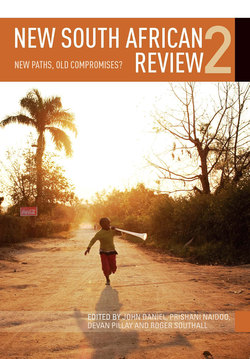Читать книгу New South African Review 2 - Paul Hoffman - Страница 34
На сайте Литреса книга снята с продажи.
THE ANC AND ZANU PF
ОглавлениеThe ANC was established in 1912 and is Africa’s oldest liberation movement. Its commitment to democracy and nonracialism is more powerful than that of Zanu PF, and the Freedom Charter which was endorsed by the ANC in 1955 at the Congress of the People pledged South Africa to a vision of nonracialism and a platform of radical popular democracy.
The ANC’s December 2007 Polokwane national conference endorsed Zuma as leader of the ANC and defeated Mbeki and his supporters. This open competition provided a sharp contrast with the national conference held by Zanu PF at the same time and which was a thoroughly orchestrated, top-down affair. The organisational report, for instance, was not discussed; it was not even distributed to delegates. A copy was held up on the podium. ‘Here is the organisational report. Does conference adopt it? Thank you very much.’(Cronin, 2008b). In contrast to the liberal, radical democratic and socialist currents of the ANC, Zanu PF has been almost entirely shaped by a bitter military struggle (in which violence was uncritically extolled and practised) and its politics are still strongly marked by ethnicity.
For three decades, Zimbabweans have been held captive by a nationalist project that has become increasingly bankrupt and incompatible with democracy, while it has been estimated that South Africa averages more protests per person than any country in the world – on average at least sixteen every day (Jacobs, 2008). Peter Alexander (2010: 27) suggests that there were some 34 000 protest gatherings between 2004 and 2008. In 2010, delivery protests reached a record high. These ‘delivery protests’ are a double-edged sword for South Africa: on one level they confirm the existence of a strong culture of protest (of a kind liquidated in Zimbabwe) but they also point towards a crisis of effective governance and place a question mark over the country’s long-term political stability.
Although Zuma was regarded by many as a problematic political alternative to Mbeki at the ANC’s Polokwane conference, it is true nevertheless that Mbeki respected the fact that he had lost the vote and he ceased to be ANC president. Moreover, in September 2008 when he was ‘recalled’ by the ANC executive, he resigned the presidency of the state and accepted the committee’s view. It is difficult to imagine Mugabe demonstrating such respect for constitutional and democratic processes. In this sense it is important to make a clear distinction between the thoroughgoing authoritarian character of Zanu PF in contemporary Zimbabwe and the real but contained and contested authoritarianism of the ANC in South Africa which still exists within, and is tempered by, the country’s broader democratic infrastructure. Just as dominance has an impact upon the strength of a democratic culture so, equally, a democratic culture has an impact upon the character of one-party dominance.
